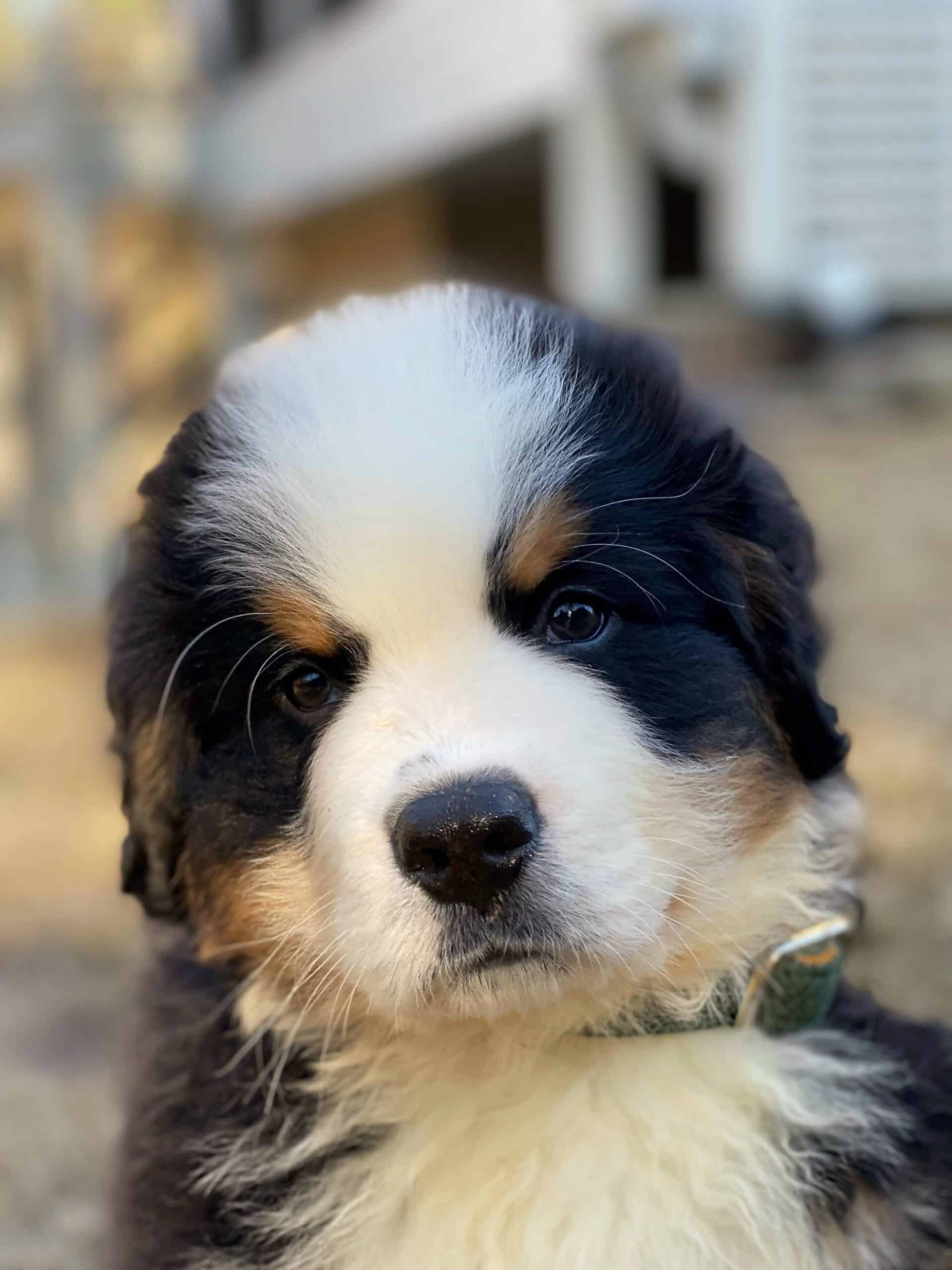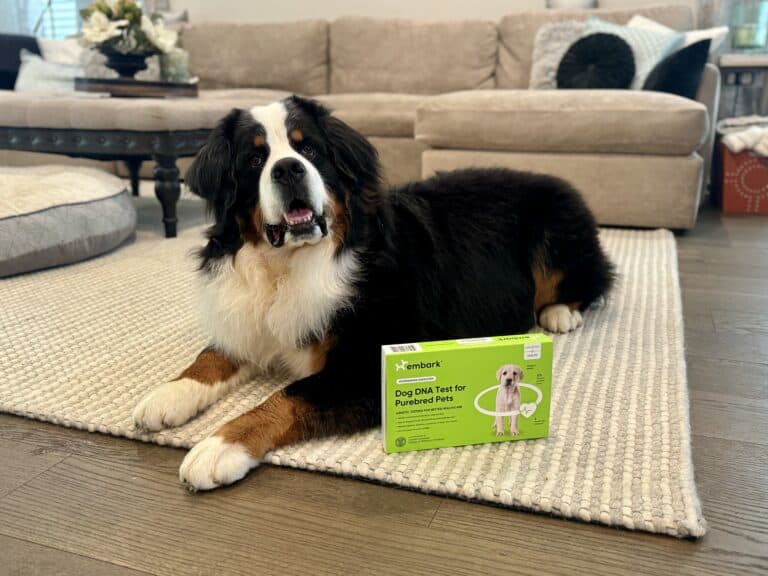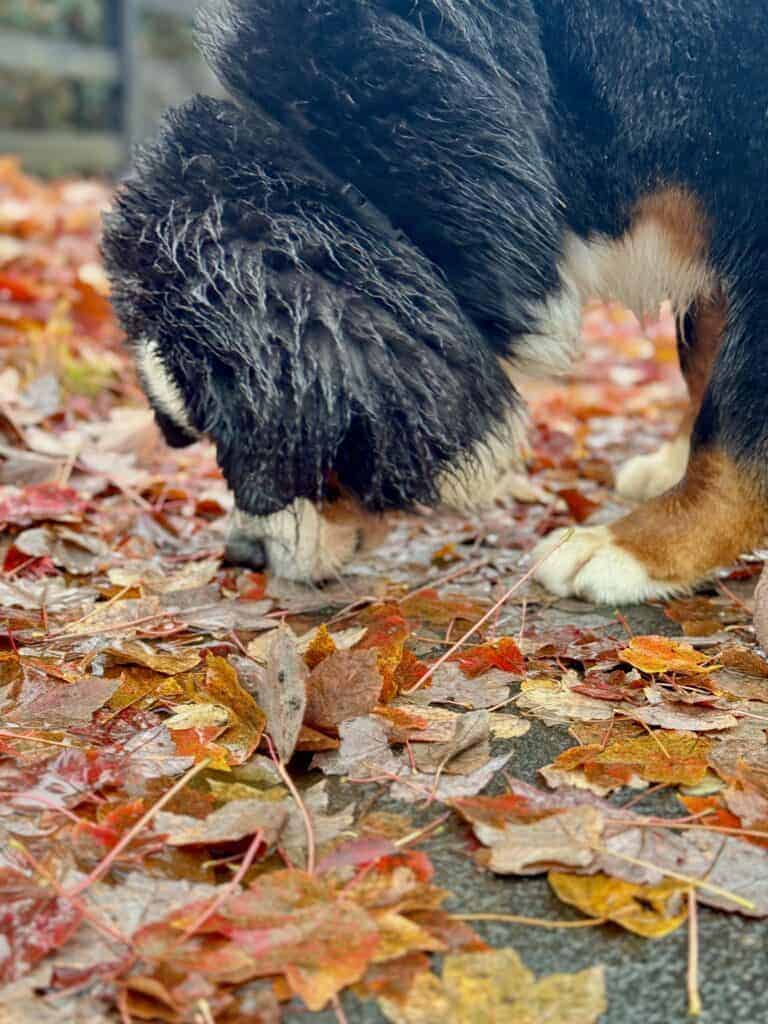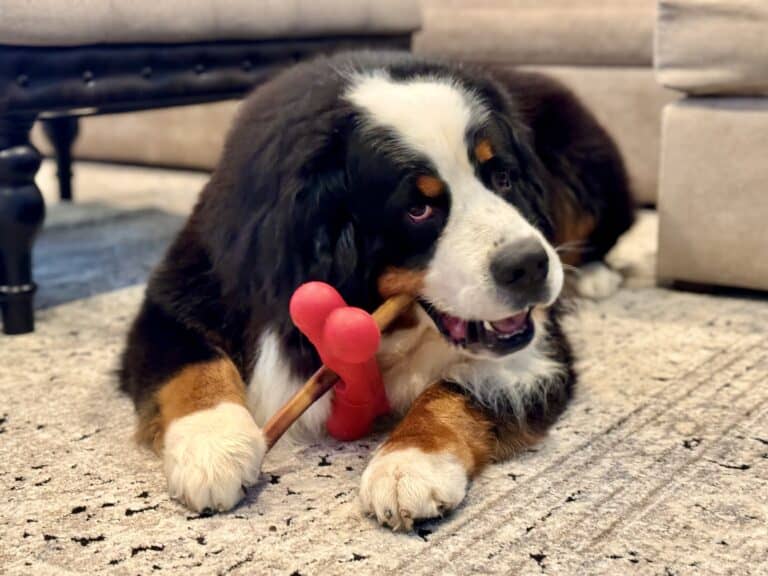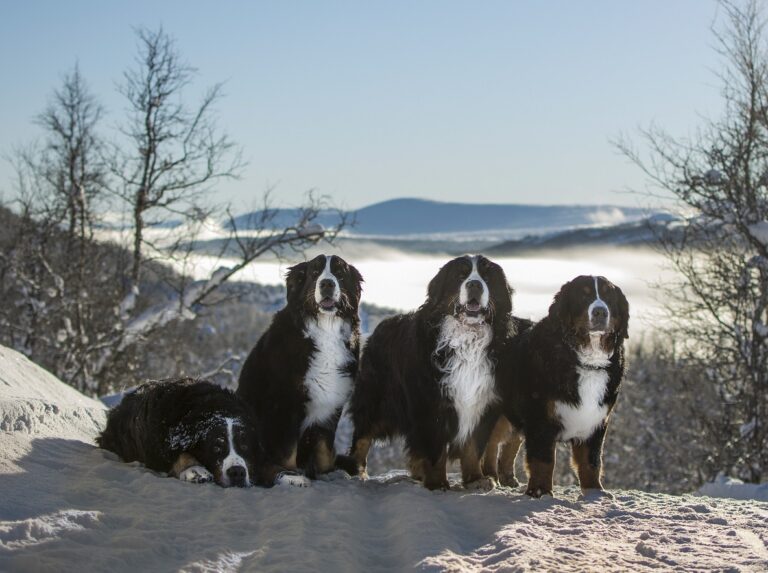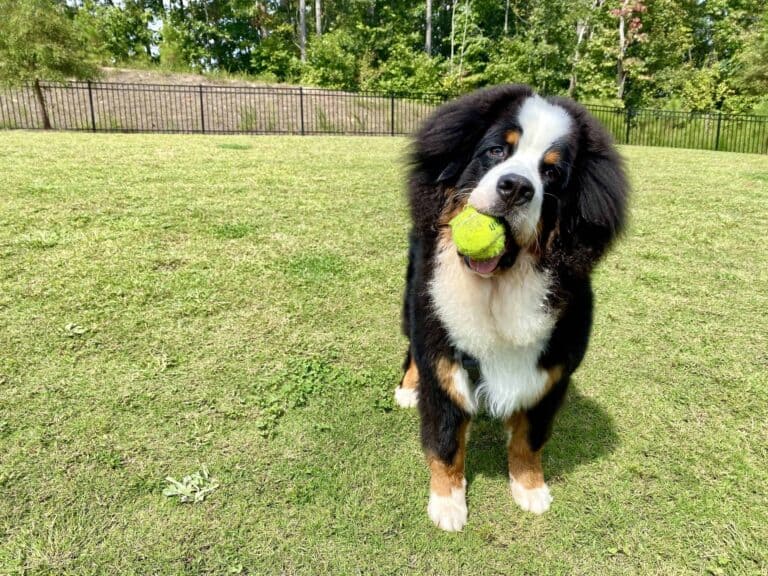How to Find Bernese Mountain Dog Breeders: A Complete Guide (2024)
Finding reputable and ethical Bernese Mountain Dog breeders can seem like a very daunting task. Scammers, puppy mills, and backyard breeders are everywhere and will stop at nothing to trick an uneducated buyer into purchasing a puppy of questionable origin and health status.
Taking the time to understand what to look for in a good breeder and performing proper due diligence will save you, your family, and your future puppy a lot of heartache. Our search for Riggie took many months, hours of research, dozens of unanswered emails, and constant participation in several Bernese Facebook groups.
But first, you must answer the question – is a Bernese Mountain Dog the right breed for you and your family? Berners are large and strong dogs with a lot of energy, want to be with their family at all times, shed profusely throughout the year, take several years to mature fully, and have short life spans. Bernese are not for everyone.
If you have researched the breed and are committed to moving forward with a Bernese, understanding how to discern legitimate breeders from illegitimate breeders is paramount. Many inheritable health conditions plague Bernese Mountain Dogs, which can significantly impact the length and quality of their life. Locating a breeder committed to preserving the breed’s health, wellness, and temperament, extensively researching their pedigrees, and testing for genetic health problems should be your top priority.
In this guide, we will review what to look for in Bernese Mountain Dog breeders, 8 things responsible and ethical breeders will do, 12 things ethical and responsible breeders will not do, a warning about AKC claims, and sources to find Bernese Mountain Dog breeders.

What to Look for in Bernese Mountain Dog Breeders
A reputable and ethical Bernese Mountain Dog breeder should always provide the following documentation to prospective puppy buyers:
1. A full multi-generational pedigree.
2. Information about the structure, temperament, health history, longevity, and causes of death of all dogs in the pedigree.
3. Copies of parental health tests and certificates for the following:
- Hip Dysplasia Evaluation by GCD, OFA, OVC, or PennHIP
- Elbow Dysplasia Evaluation by GDC, OFA, or OVC
- OFA or CERF Eye Examination
- OFA Heart Evaluation
- Von Willebrand Disease DNA Test (vWD) Type 1
- Degenerative Myelopathy DNA Test for SOD1-A and SOD1-B (D.M.)*
- Thyroid certification based on OFA requirements*
- Histiocytic Sarcoma Pre-Test from Antagene
* Von Willebrand Disease and Degenerative Myelopathy tests are both available through the Dog DNA Test from Embark.
4. A written contract before any exchange of money that includes:
- A guarantee of registration papers (U.S. – American Kennel Club (AKC), Canada – Canadian Kennel Club (CKC), U.K. – Royal Kennel Club (RKC), Australia – Australian National Kennel Council (ANKC).
- Limited registrations or spay/neuter requirements for puppies that do not meet breeding standards.
- Terms and conditions of the sale of a puppy.
- Responsibilities of both parties.
- Requirements to fulfill defined guarantees (for example, a certain number of days to have the puppy evaluated by a vet).
- Agreement to take back any dog and assist in re-homing.
5. Thorough information on properly caring for a Bernese Mountain Dog, including feeding, grooming, and training.
6. References from their veterinarian and previous puppy buyers.
7. Name of Bernese Mountain Dog Clubs of which they are an active member.
8. Verification that their dogs are in the Berner-Garde Foundation database, a non-profit organization dedicated to accumulating and disseminating health information about Bernese Mountain Dogs. You should always look up this information yourself to confirm.
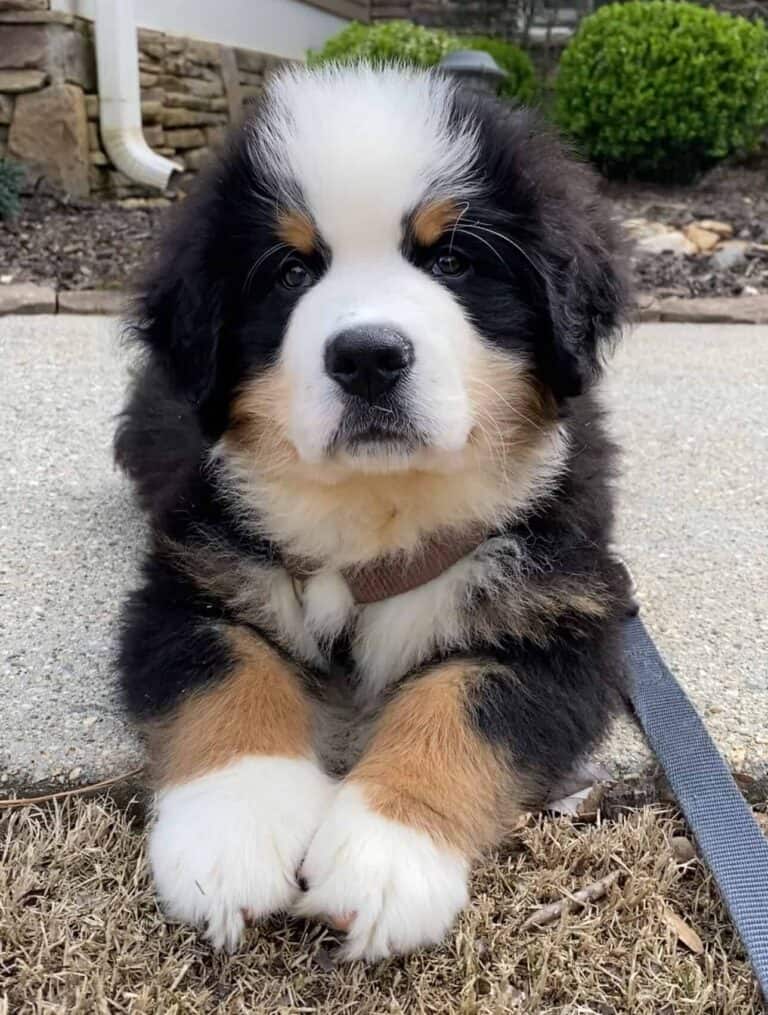
8 Things Responsible and Ethical Breeders Will Do
There are specific requirements every prospective puppy buyer should look for in a breeder, regardless of the breed they are looking to acquire. Beyond the breed-specific information already discussed, use the 8 actions below to evaluate the quality of a breeder and their breeding program. Here are 8 things responsible and ethical Bernese Mountain Dog Breeders will do:
- Offer the opportunity to meet both parents of the puppy in person.
- Discuss how many dogs they own, where they live, and how their breeding program operates.
- Describe the types of activities their dogs participate in, including conformation, obedience, draft, rally, agility, etc.
- Maintain an online presence that features all dogs they own or breed with registered names, titles, and health clearances.
- Thoroughly interview you to ensure your family, home environment, and lifestyle fit their dogs well.
- Evaluate each puppy’s temperament to match the potential buyers properly.
- Describe how they properly socialize their puppies before placing them in their new homes.
- Be available on an ongoing basis to answer questions and offer support for your dog’s entire life.
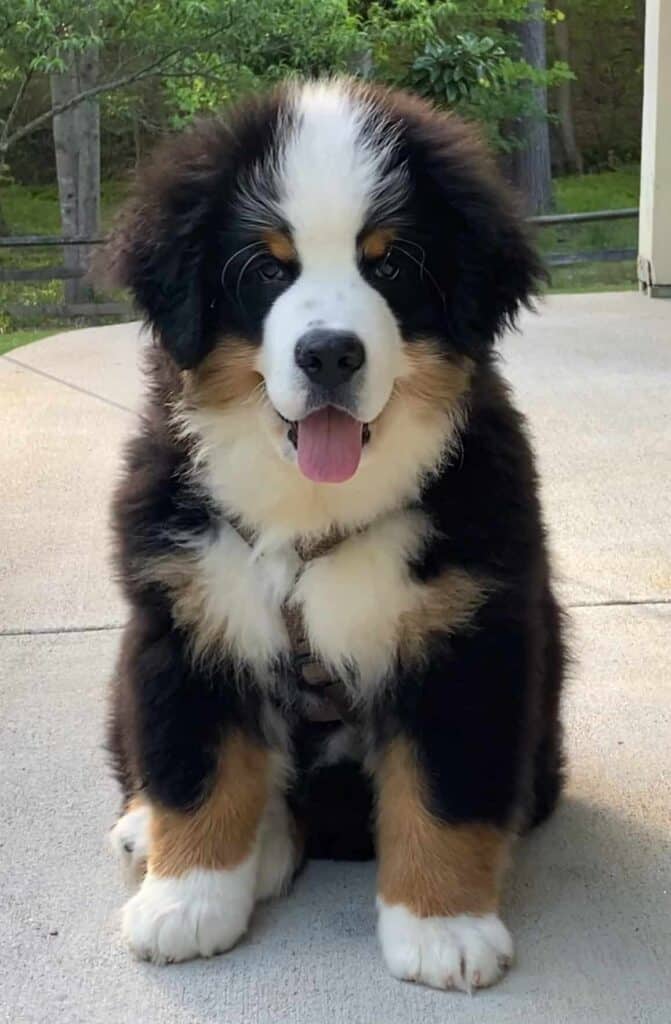
12 Things Responsible and Ethical Breeders Will Not Do
Many actions are clear indicators of a questionable breeder. Knowing what a good Bernese Mountain Dog breeder will do is as important as knowing what they will not do. Here are 12 things responsible and ethical Bernese Mountain Dog breeders will not do:
- Allow a puppy to be purchased and placed before 8 weeks old.
- Require a deposit before providing the pedigree, health information, and contract.
- Provide guarantees without detailing the requirements of those guarantees.
- Rush or pressure a buyer to make a decision.
- Ship a puppy in cargo on an airplane.
- Make health claims without providing proof.
- Avoid discussing health problems in the breed.
- Buy dogs for resale.
- Sell breeding pairs.
- Sell dogs to breeders who produce mixed breeds, such as Bernedoodles.
- Require a puppy to be bred regardless of quality or health.
- Require a dog to remain intact to be used for breeding.
Arming yourself with as much information as possible and understanding the unique characteristics and nuances of the breed is vital. BMDInfo.org offers an excellent list of questions to ask prospective Bernese breeders. Most of this information should be available on the breeder’s website or provided upon filling out a potential puppy buyer questionnaire. However, these questions can be used as a guide to help fill in any information gaps and ensure you do not miss an important topic.
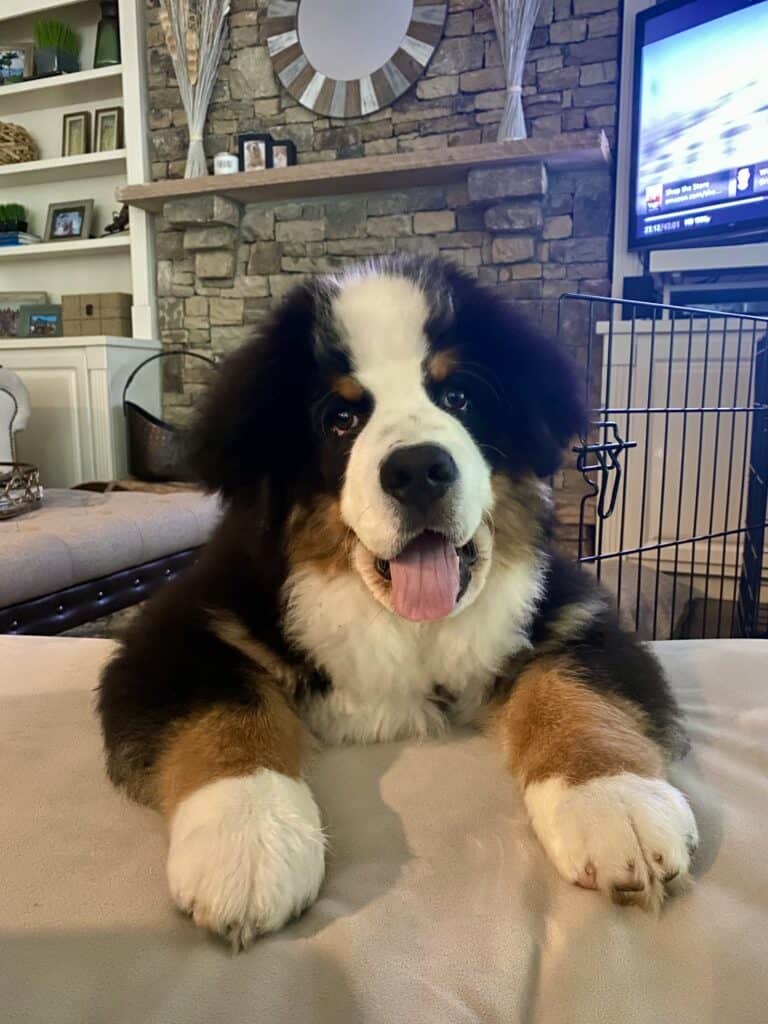
A Warning Regarding AKC Registration Claims
Being American Kennel Club (AKC) registered does not guarantee or even indicate that a puppy is of good quality or health status. All that means is that the puppies were born to an AKC-registered sire and dam, the puppies meet the breed standard to some degree, and the breeder paid money to the AKC. Health tests are not required to be AKC registered.
However, no responsible American breeder uses any other registry. The puppy mill industry has spawned many bogus registries to trick buyers. AKC registration is a small but necessary part of a much larger picture when purchasing a pure-bred dog.
“AKC Inspected” is also a claim that means nothing. Every breeder of AKC-registered dogs is subject to inspection. “USDA Inspected” almost always means dealing with an unethical puppy mill where dogs are held captive in deplorable conditions and forced to endlessly breed for profit.
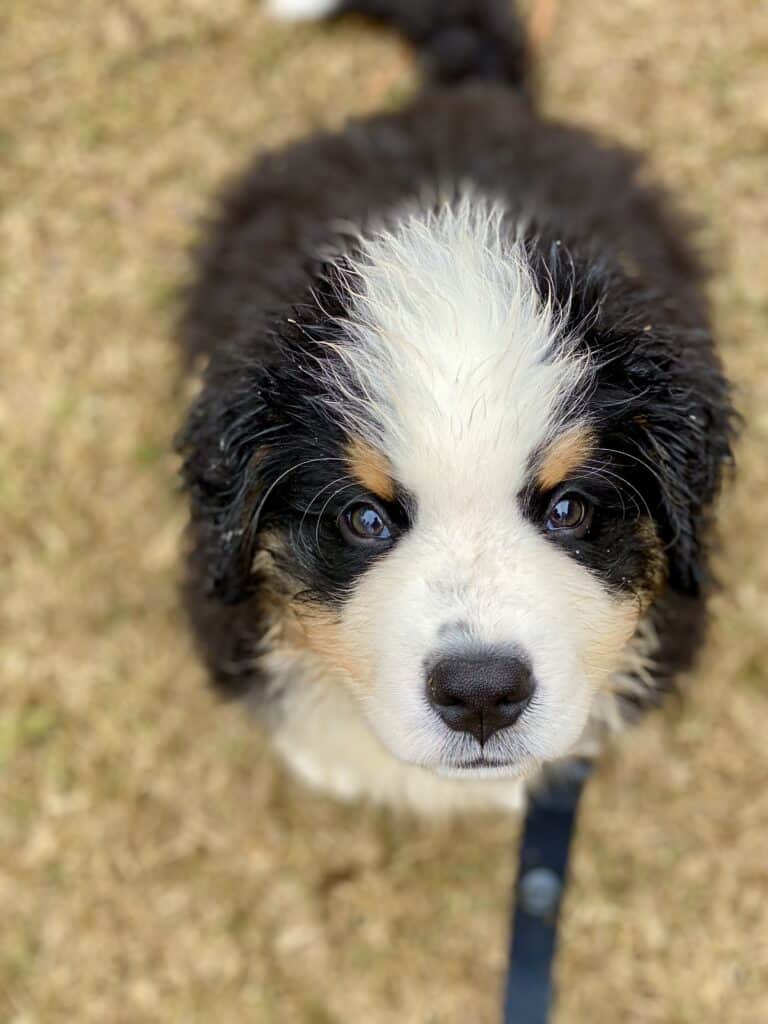
Sources to Find Reputable and Ethical Bernese Mountain Dog Breeders
The 3 primary sources for legitimate Bernese Mountain Dog breeder referrals in the United States are:
1. Bernese Mountain Dog Club of America Breeder Directory
3. Regional Bernese Mountain Dog Club Referrals
These organizations provide lists of breeders who adhere to ethical breeding practices, are devoted to the preservation and health of the breed, and are involved in various activities with their dogs, such as conformation, drafting, and sports. Be highly suspicious of any pure-bred dog breeder who is not a member of or does not participate in their respective breed clubs.
Outside of the U.S., you can visit your respective Bernese Mountain Dog Club webpage for more information:
- Bernese Mountain Dog Club of Canada
- Bernese Mountain Dog Club of Great Britain
- Bernese Mountain Dog Club of Victoria
- Bernese Mountain Dog Club of Western Australia
- European Bernese Mountain Dog Clubs

Please remember that patience is the key. Finding a good breeder takes time, and there will likely be a long wait for one of their puppies. Go into your search knowing that it will be a process that could take months or even years. Do not allow your emotions to get the best of you and then make an impulsive decision, further perpetuating the problem of unethical breeders.
Additionally, always trust your gut. If something does not feel right, it probably is not right. With so many people preying on the intense emotions of impatient puppy buyers, it is best to keep a skeptical mindset during your search and work through the lists above to determine if a breeder is legitimate.
We hope this guide helps you find a healthy and well-bred Bernese Mountain Dog puppy. Knowing that you purchased your puppy from a breeder invested in the well-being and longevity of this wonderful breed will give you peace of mind and ensure that you are not contributing to the heartbreaking problem of puppy mills or backyard breeders.
PLEASE NOTE: You may have noticed one notably absent topic in this article – cost. The cost to purchase a puppy is NOT an indicator of quality. Many “designer” mixed breeds cost more than purebred dogs and are of questionable origin and health status. For a complete breakdown of the costs to purchase and own a Bernese Mountain Dog, check out How Much Do Bernese Mountain Dogs Cost?
If you are interested in adopting a Bernese Mountain Dog from rescue, be sure to read Bernese Mountain Dog Rescue: Everything You Need to Know.
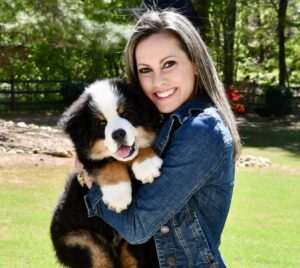
Katie Vincent is a dog lover, world traveler, and passionate creative who left a successful career in medical device sales to become a digital marketer, content creator, and writer. She has owned large-breed dogs for over 30 years, traveled to 42 countries, and taken 57 online courses. She now writes about all three at Riggie the Berner, Travel Planner Katie, and Creator Katie.


